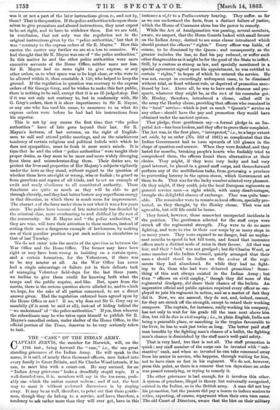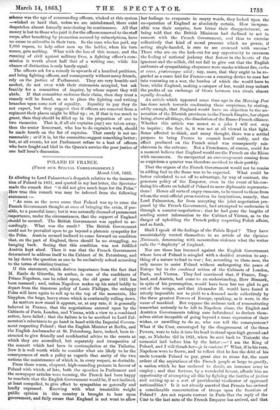THE " CASE " OF THE INDIAN ARMY.
CAPTAIN JERVIS, the member for Harwich, will, on the 17th inst., bring forward the "case," i.e., the one great standing grievance of the Indian Army. He will speak in the name, it is said, of nearly three thousand officers, men linked into every family in Great Britain, and Sir Charles Wood intends, if he can, to meet him with a count-out. He may succeed, for an "Indian Army grievance" looks a dreadfully stupid topic. If a well-founded one, it is, members will say in the tea-room, prob- ably one which the nation cannot redress ; and if not, the best way to meet it without awkward discussions is by staying away. It may be as well, therefore, to point out that these gentle- men, though they do belong to a service, and have, therefore, a tendency to ask rather more than they will ever get, have in this
instance a rigid to a Parliamentary hearing. They suffer, so far as we can understand the facts, from a distinct failure of justice, which the House of Commons alone has the power to remedy.
While the Act of Amalgamation was passing, several members, aware, we suspect, that the Horse Guards looked with small favour on the Indian Army, desired to see some clause introduced which should protect the officers' "rights." Every officer was liable, of course, to be dismissed by the Queen ; and consequently, as the greater includes the less, to find his pay reduced, or suffer such other disagreeables as it might be for the good of the State to inflict. Still, by a custom as strong as law, and specially mentioned in a special agreement signed upon his appointment, he was entitled to certain "rights," in hopes of which he entered the service. He was not, except in exceedingly unfrequent cases, to be dismissed without trial, or fined without rule, or deprived of promotion sanc- tioned by law. Above all, be was to have such chances and pro- spects, whatever they might be, as the rest of his comrades got. Mr. Henley, therefore, introduced a clause, called still in the army the Henley clause, providing that, officers who remained in the " local " service—which is just as much " Queen's " service as any other— should have the pay and promotion they would have obtained under the ancient system.
That pledge, these gentlemen say—a formal pledge in an Im- perial Act—has been broken, and they offer to prove their complaint. The Act was, in the first place, "interpreted," i.e., to a large extent set aside, by an order (No. 332 of 1861) so complicated that the Indian Government had to issue upwards of 150 glosses in the shape of question and answer. When they were finished, and they lasted for months, breaking people's hearts who foolishly tried to comprehend them, the officers found three alternatives at their choice. They might, if they were very lucky and had very good interest, be placed in a grand staff corps, and thenceforward perform any of the multifarious tasks, from governing a province to preventing larceny in the opium stores, which Government set them to do. That was for the lucky number selected very pleasant. Or they might, if they could, join the local European regiments as general service men —a right which, with many disadvantages, brought the delightful chance of exchange. That was quite bear- able. The remainder were to remain as local officers, specially pro- tected, as they thought, - by the Henley clause. That was not agreeable, but still life could be borne.
'I hey found, however, these somewhat unexpected incidents in the position. The gentlemen selected for the staff corps were struck off the regimental strength. They were to do no more fighting, and were to rise in their new corps by so many steps in so many years. They were exposed to no danger, had no unplea- sant months to spend in hot hill tents, and found that insurance offices made a distinct scale of rates in their favour. All that was fair, and their "luck" was not grudged ; but Sir Charles Wood, or some member of the Indian Council, quietly arranged that their nairlis should stand in italics on the cadres of the regi- ments they had abandoned. So while they had no fight- ing to do, those who had were debarred promotion ! Some- thing of this sort always existed in the Indian Army ; but then "officers on civil employ," though they did none of the regimental drudgery, did share their chance of the bullets. An imperative official and public opinion required every officer so em- ployed to join his regiment in action, and as a matter.of fact they did it. Now, we are assured, they do not, and, indeed, cannot, for they are struck off the strength, except to retard their working compeers. The captain, for instance, really working his company, has not only to wait for his grade till the man next above him dies, but till he dies in civil employ; i.e., in plain English, India not being a peaceable place, or marching in the tropics favourable to the liver, he has to wait just twice as long. The better paid staff man benefits by the fighting man's chance of a bullet, the fighting man's chance is diminished by the staff man's well-paid safety.
That is very hard, but that is not all. The staff promotion is quick ; any staff member of the corps can be invested with "sub- stantive" rank, and when so invested he can take command away from his senior in service, who happens, through waiting for him, not to have risen so fast in his regiment. We do not, however, press this point, as there is a rumour that ten days since an order was passed remedying, or trying to remedy it.
The other grievance is bad enough, for it involves this other. A system of purchase, illegal in theory, but universally recognized, existed in the Indian, as in the British army. A man did not buy his promotion, but the juniors did pay a bonus to induce seniors to retire, expecting, of course, repayment when their own turn came. , The old Court of Directors, aware that the blot on their military scheme was the age of commanding officers, winked at this system —winked so hard that, unless we are misinformed, there exist despatches almost formally sanctioning its continuance. All that money is lost to those who paid it, for the officers removed to the staff corps, after benefiting by promotion secured by subscriptions, have no cause to subscribe in their turn. So the man who has paid, say 7,000 rupees, to help other men up the ladder, when his turn comes, gets nothing. What with the loss of this money, and the running of civil against military lives, a fighting officer's com- mission is worth about half that of a writing one, while his chance of distinction is only barely equal.
The officers ask for a remedy in upwards of a hundred petitions, and being fighting officers, and consequently without many friends, rely on the justice of Parliament. They are very humble and modest, do not even wish their statements accepted, but ask frankly for a committee of inquiry, by whose report they will abide. If that committee endorses their claim, then they trust a remedy will be found, so as to place the fighting and writing branches upon some sort of equality. Equality in pay they do not expect, but they suggest that if officers are removed from a regiment their places might be filled up ; or, if that is too much to grant, then they should be filled up in the proportion of one to two vacancies. That is, if all six captains (say) are taken away, then the senior lieutenant, who has to do captain's work, should be made fourth on the list of captains. That surely is not un- reasonable; or if it is, let the committee suggest something better; but, at all events, let not Parliament refuse to a host of officers who have fought and bled in the Queen's service the poor justice of one half hour's discussion.































 Previous page
Previous page